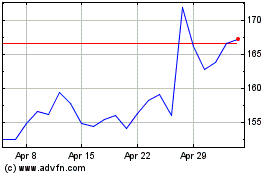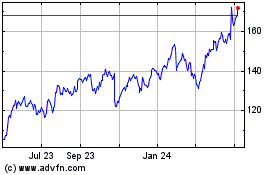By Sam Schechner and Valentina Pop
Alphabet Inc.'s Google has bowed to pressure from European Union
antitrust chief Margrethe Vestager in offering better terms to
rival search engines that want to appear on Android phones under a
$4.8 billion antitrust decision against the tech giant.
Under the new terms, disclosed online earlier this week, Google
will effectively charge other search engines less money, and
sometimes no money, to appear on a "choice screen" that allows new
Android-phone users in Europe to choose a default search
engine.
The changes show how Ms. Vestager is taking a tougher stance on
the U.S. tech giant, two weeks after she acknowledged that the
record fines she has slapped on Google weren't "doing the trick"
and that more sweeping remedies are needed.
"We have been discussing the choice screen mechanism with
Google," a spokeswoman for Ms. Vestager said, adding the talks came
after the EU received feedback from search rivals about the choice
screen.
A Google spokeswoman declined to comment beyond the online
statement, which says the changes were "developed in consultation
with the European Commission," the EU's antitrust enforcer, and
will take effect in March 2020.
How to move beyond fines in antitrust enforcement of tech firms
has become a hot topic. Experts have argued that such cases often
take so long that by the time they are decided, the alleged
monopolist is already entrenched and the damage is hard to
undo.
Makan Delrahim, head of the U.S. Justice Department's antitrust
division, said on Tuesday that no measure should be out of reach as
regulators look at tech companies. Speaking at the WSJ Tech Live
conference, Mr. Delrahim said that even that breaking up big
Silicon Valley companies is "perfectly on the table." He didn't
discuss examination of specific companies.
Ms. Vestager, in hearings for a second term as competition
commissioner earlier this month, said breaking up firms is
something she can do, but only as a last resort. Instead, she said
she wanted more powers to reorganize a market dominated by
companies such as Google.
"My obligation is to do the least intrusive thing in order to
make competition come back," she said.
In Europe, Google's rivals have complained that the company has
crafted its compliance with the EU's antitrust decisions in ways
that don't fundamentally change the competitive landscape. Such
complaints have led the EU to demand other changes to past
remedies, though this week's changes don't satisfy some
competitors.
"It's a minor improvement from what it was," said a spokesman
for DuckDuckGo, a privacy-centric search engine. "But it's still a
pay-for-play. And it still doesn't offer more than four slots" on
Android's choice screen.
One competition lawyer who has represented Google rivals also
said the new choice screen will be rolled out only on new Android
phones. "I see no reason why the search engine choice screen cannot
feature on existing Android devices," said Thomas Vinje, a partner
at law firm Clifford Chance.
The company said it isn't applying the choice screen to existing
phones because it requires technical changes that "can only be
supported on new devices."
Google says it will auction off slots on the choice screen to
make up for revenue it generates from use of its search engine on
Android phones, so it can "continue to invest in developing and
maintaining" the operating system.
Depending on how it is implemented, a choice screen could end up
eating into Google's market share in mobile search. In Russia in
2017, Google asked Android users in the country to select a default
search engine, something Russian search engine Yandex said boosted
its share of mobile searches in the nation by about 10 percentage
points over the following year.
DuckDuckGo said it recently conducted surveys in the U.K.,
Germany and the U.S. that show similar potential. Asked what search
engines users would select in a choice screen, users selected
Google at rates at least 11 percentage points below the company's
current market share, with a bigger decrease if more search engines
are shown, DuckDuckGo said.
Google's concession on Android this week comes as part of the
company's compliance with a 2018 decision that found Google had
abused the dominance of Android to strong-arm phone makers into
installing its eponymous search engine on mobile phones.
In response to the decision, Google appealed, but also ended
contractual terms the EU said were anticompetive because they
required phone makers to pre-install Google's search engine if they
wanted to include Google's Android app store.
Several months later, under pressure from the EU, the company
went further: Google said it would begin proactively asking Android
smartphone users in Europe to select a default search engine from a
list that included Google and three rivals available in a given
country.
But the company again stoked ire among competitors when it
announced details of that choice screen over the summer -- in
particular because it said it would auction off slots for choice
screen in each EU country to the three highest bidders, forcing
competitors to pay at least a minimum-bid amount each time a user
selected a rival.
On Monday, Google changed those terms again. The new terms
remove the minimum bids, and oblige the three winning search
engines with the highest bids in a given country to pay only the
amount paid by the fourth-highest bidder.
That would lower the cost for bidders to appear on the list, and
which means that in countries with fewer than four bidders, the
cost to appear on the screen for eligible search engines would fall
to zero.
Write to Sam Schechner at sam.schechner@wsj.com and Valentina
Pop at valentina.pop@wsj.com
(END) Dow Jones Newswires
October 23, 2019 14:02 ET (18:02 GMT)
Copyright (c) 2019 Dow Jones & Company, Inc.
Alphabet (NASDAQ:GOOGL)
Historical Stock Chart
From Mar 2024 to Apr 2024

Alphabet (NASDAQ:GOOGL)
Historical Stock Chart
From Apr 2023 to Apr 2024
